News
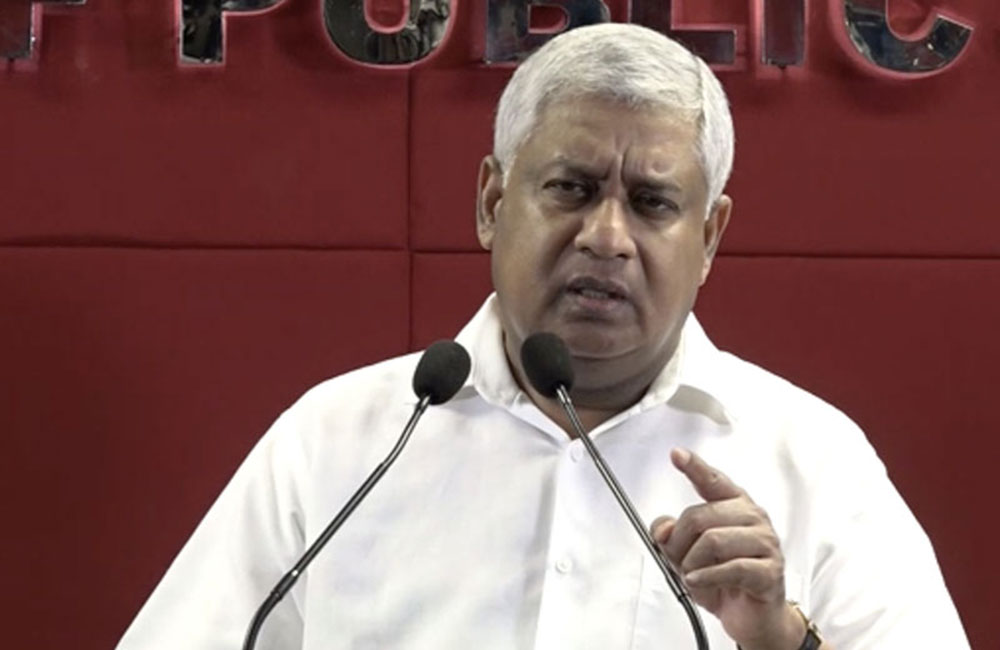
Statement to public from Minister of Public Security
Minister of Public Security Tiran Alles has issued a statement with regard to a remark made by a public representative in reference to an incident at the Ratwatte Estate in the Elkaduwa Plantation in the Matale District.
Stating that violence will not be allowed, Minister Alles stated that the public representative had claimed that it was their right to take action if the government and laws do not protect them.
Minister Tiran Alles requested the estate community and the general public to refrain from taking the laws into their hands and to refrain from acting in such a manner.
The minister warned that stringent action will be taken against those taking the laws into their hand and those aiding such behaviour by falling victim to incidents created by politicians and political parties aiming to secure votes for elections.
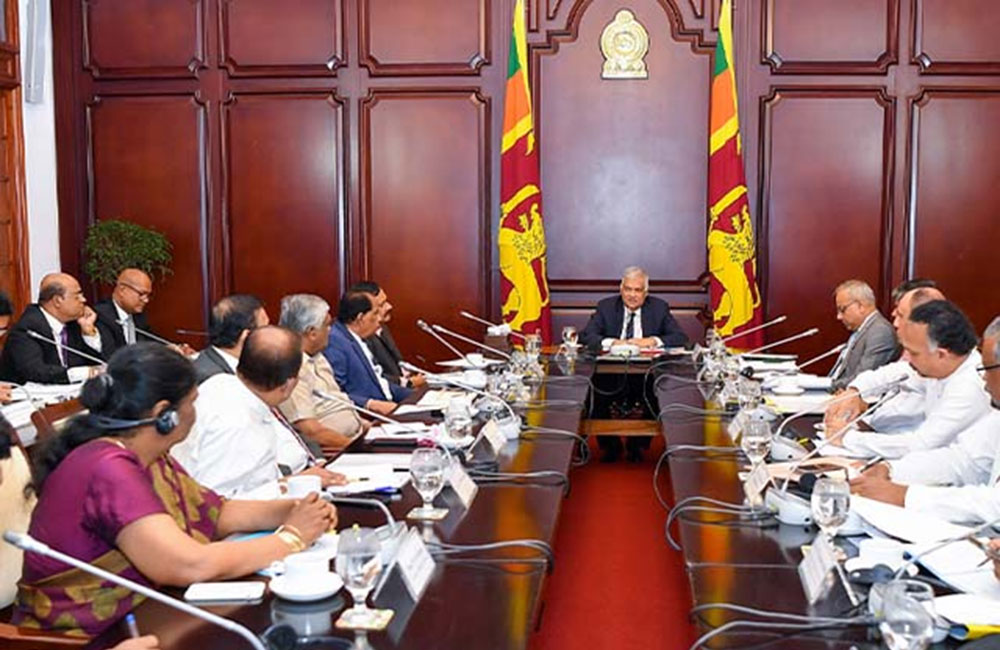
President meets Provincial Governors
President Ranil Wickremesinghe announced the development of a novel approach aimed at optimizing the operations of the Local Council, Provincial Council, and Central Government sectors, all geared towards curbing financial inefficiencies. The President directed officials to devise this new mechanism, placing a distinct emphasis on the efficacy of these three entities.
Furthermore, President Wickremesinghe instructed officials to collaborate with Provincial Governors and Chief Secretaries in order to draft a comprehensive report on this matter within a month. These consultations are intended to ensure a well-rounded perspective before formulating the new approach.
These assertions were made during a recent meeting at the Presidential Secretariat, where President Wickremesinghe engaged with Provincial Governors and Chief Secretaries. The purpose of this assembly, held yesterday (17) afternoon, was to deliberate on the forthcoming administrative procedures associated with the provincial council system.
Expressing his views further, the President said;
Today, I’ve gathered all of you to engage in a discussion about the governance framework associated with the empowerment of Provincial Councils. Our focus needs to be on how to progress in this direction while also considering the administrative structure of the central government.
In certain instances, identical services are delivered by the three different tiers of administration: the Local Council, the Provincial Council, and the Central Government. Take, for instance, tasks like drain maintenance, electric pole installation, and road construction. Unfortunately, this redundancy results in significant financial wastage. If this is indeed the case, it becomes imperative to establish a fresh mechanism that centres around the coordination of these three entities.
I have recommended the formulation of a novel system within a month’s time, following consultations with the Provincial Chief Secretaries. This step is crucial since the provincial councils are presently non-operational and bereft of ministers. Consequently, you, the Provincial Governors, hold complete governing authority within the current provincial council system.
The previous year posed considerable challenges for us, an experience I believe we need not relive. As we strive to tackle the economic predicaments of the nation, our efforts must also encompass the restoration of the country’s governance structure.
Of notable significance is that grassroots services are overseen by the provincial councils, while district-level services fall under the purview of the central government. It’s essential that these undertakings progress harmoniously, without competing with each other, as we endeavour to offer these services jointly.
The food security program has now been successfully rolled out across the entire nation. As a result, we are optimistic about a bountiful harvest in the upcoming season. Despite a decrease in the prevalence of malnutrition among the population compared to last year, we mustn’t become complacent.
It’s worth noting that the Aswasuma program played a pivotal role in reducing malnutrition among the citizens of our country. The advantages stemming from the Aswasuma initiative extend beyond mere prosperity.
Given that the parliamentary session will continue until the close of the next year, it’s essential to extend the opportunity for parliamentarians to engage in local government matters. Additionally, plans are underway to establish a dedicated advisory committee that will collaborate closely with the governor.
Simultaneously, we are also addressing the powers of provincial councils as outlined in the 13th Amendment of the constitution. Notably, a special emphasis has been placed on enhancing education, professional training endeavours, and the establishment of new universities in each respective province.
To bolster the growth of the tourism industry, there are intentions to establish tourism boards at the provincial level. It’s also pertinent to mention that numerous programs aimed at incentivizing investors and entrepreneurs are anticipated to be implemented at the provincial level in the future.
Mr. Saman Ekanayake, the Secretary to the President, expressed his anticipation for the backing of the Presidential secretariat in addressing the challenges confronted by Provincial Councils in their interactions with the Central Government.
During the discourse, the provincial governors in attendance conveyed to the President the urgent requirement to promptly fill teacher vacancies within their respective provincial council jurisdictions. They noted the presence of surplus teachers in certain schools, juxtaposed with teacher shortages in others. In response, they sought the implementation of a teacher exchange program to rectify this imbalance.
Highlighting the issue of incomplete two-story buildings constructed under the “the best school is the nearest school” concept, the governors emphasized instances of building deterioration and appealed for the formulation of a suitable program to address this concern.
The governors also drew attention to stalled development projects for which allocations had been designated. Regrettably, the funds for some of these projects were still pending.
In addition to these matters, the Provincial Governors made a request to the President to facilitate opportunities for advancing the tourism industry at the provincial level.
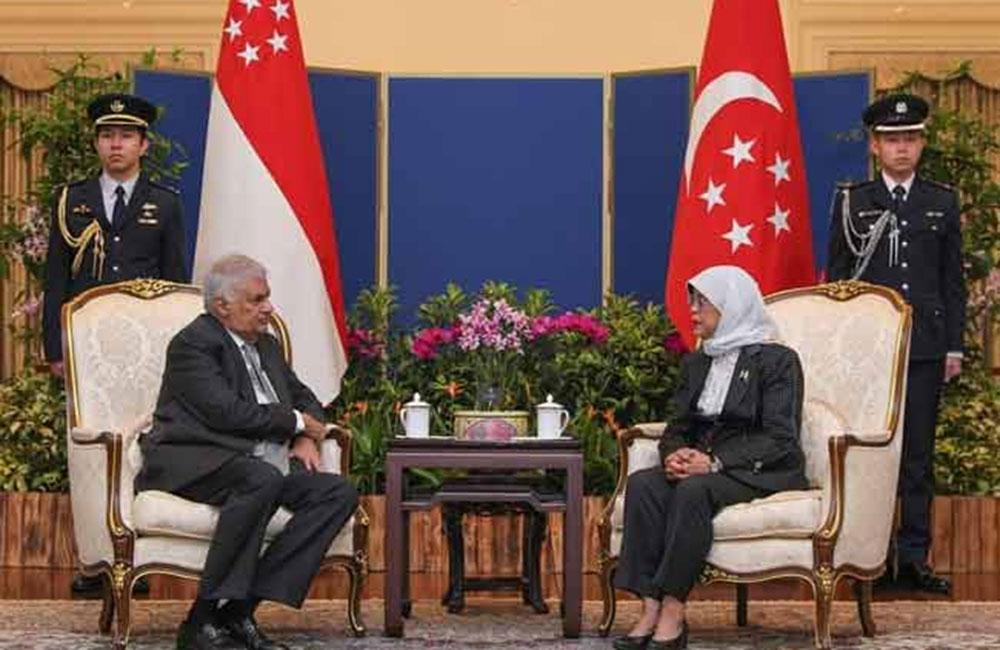
President Ranil meets Singapore’s President
President Ranil Wickremesinghe has met with Singapore’s President, Madam Halimah Yacob on Monday at the Istana in Singapore, the President’s Media Division (PMD) announced.
In a note on her official Facebook page, President Yacob said that the two leaders had fruitful discussions, covering topics including food security, renewable energy and regional economic cooperation.
“Our friendship is anchored by strong people-to-people ties and cooperation across various sectors. There is much scope to deepen our ties. I wish President a productive visit in Singapore,” President Yacob noted in her post.
President Wickremesinghe left for a two-day official visit to Singapore this morning (21), along with a series of significant meetings planned, including discussions with Prime Minister Lee Hsien Loong, Defence Minister Ng Eng Hen, and Sustainability and Environment Minister Grace Fu Hai Yien.
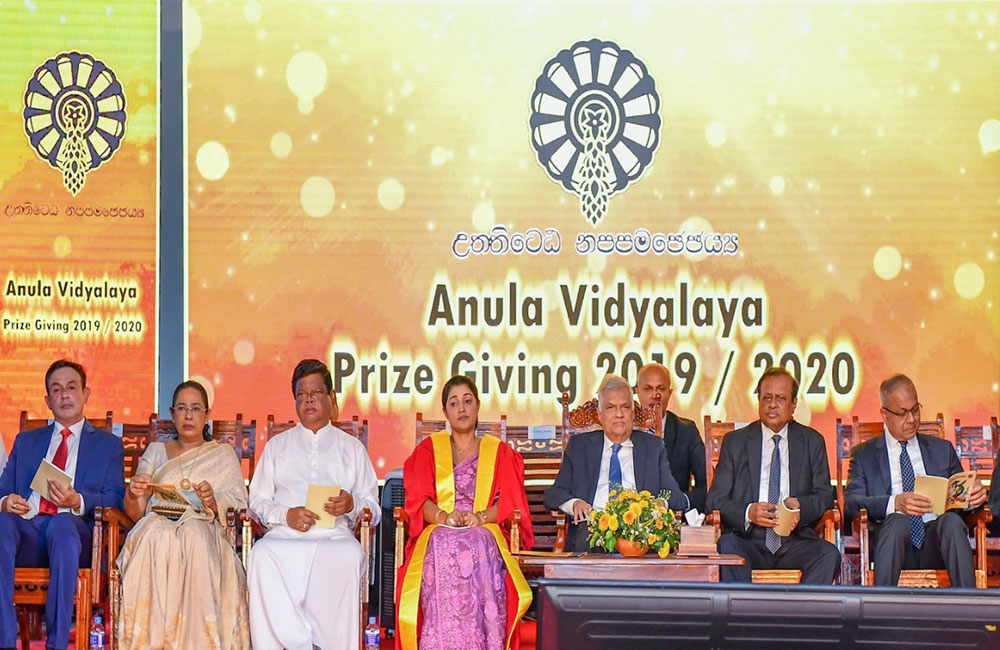
President reveals plans to introduce ‘modernised’ education system
President Ranil Wickremesinghe announced plans to introduce a modernised education system in the country that can effectively address upcoming global challenges and incorporate modern technology.
He highlighted the critical role of science and technology in various sectors of the world economy. Notably, he pointed out that areas such as artificial intelligence, robotics, energy storage, blockchain technology, and genome science have significant impacts on the global economy.
President Wickremesinghe made these remarks during the 2019/2020 annual prize giving ceremony at Anula Vidyalaya in Nugegoda yesterday (16 Aug).
He stressed the importance of moving forward collectively towards the future, steering away from political traditions fixated on the past. He underlined that progress for the country depends on embracing a novel education system.
During the event, President Wickremesinghe also honoured accomplished female students from Anula Vidyalaya, Nugegoda who excelled in the recent advanced level examination.
He expressed gratitude towards the dedicated teachers and was presented with a commemorative gift by the school’s principal, marking the historic occasion of a President visiting Anula Vidyalaya in Nugegoda.
Further addressing the gathering, President Ranil Wickremesinghe extended his appreciation to the teachers and students, acknowledging the substantial progress of Anula Vidyalaya.
He reflected on the school’s humble beginnings and its transformation into one of the country’s leading educational institutions.
Emphasizing the school’s role in shaping future generations, he highlighted the evolution of the education system over the past five decades.
“During the time of President J.R. Jayawardena, the education landscape primarily consisted of textbooks. However, today’s educational paradigm has integrated the use of cell phones and computers. This evolution also extends to the realm of transportation, as the concept of electric vehicles was non-existent in the past, but now they are an integral part of society. The rapid advancement of science and technology is evident, necessitating a contemporary education system to thrive in this environment.
It’s evident that a country’s progress hinges on an education system that aligns with societal needs. To construct a prosperous nation, it’s imperative to nurture a promising future generation. Education stands as the cornerstone for laying the foundation to empower this generation to surmount challenges.
The need of the hour is an education framework that is forward-thinking and future-oriented. Our nation must be equipped to confront the potential challenges arising from climate change. The global phenomenon of climate change warrants meticulous study, as exemplified by the current environmental crises in Europe.
The United Nations’ decision to advance the climate change agenda’s implementation by a decade, due to the urgent nature of the issue, underscores the gravity of the situation. Nations worldwide are gearing up to fulfil the climate agenda by 2040, a decade ahead of the original 2050 timeline.
The modern world economy thrives on various sectors driven by scientific and technological advancements. Artificial intelligence, robotics, energy storage, blockchain technology, and genome science represent just a fraction of the fields influencing the global economy. It’s paramount that we ready ourselves for these transformative shifts.
Economists project that the integration of these technologies could contribute a substantial $300 to $700 trillion to the global economy by the mid-21st century. The world is progressing within this economic trajectory, necessitating our proactive preparedness.
Much like the readiness exhibited towards the apparel industry in the 1970s and 80s, we must now embrace these emergent technologies. This calls for a fundamental overhaul of our education system. A proliferation of universities specializing in these domains is imperative.
Furthermore, proficiency in languages such as English, Chinese, and Hindi is vital. Schools and higher education institutions must be established as centres of knowledge dissemination in these fields. Consequently, our strategy encompasses the establishment of non-state universities alongside state institutions.
A scheme akin to the subsidized loan systems abroad has been devised to enable students to pursue education in non-government universities without financial constraints interrupting their academic pursuits.
Today, you belong to the Gen Z generation. The succeeding generation, referred to as Gen Alpha, must be equipped to navigate a vastly transformed educational landscape, possibly acquiring knowledge through mobile devices. This paradigm shift in education necessitates our proactive adaptation.
While politicians tend to focus on past matters, as students, our attention should be on the present. Yet, we set our sights on the future, compelling us to recalibrate our approach and surge ahead. Those tethered to historical perspectives must be bridged to the present, where insights into the future are attainable.
Without modifying our educational framework, our prospects appear bleak. Progress is only conceivable through the adoption of a novel educational system.
While factories, edifices, and thoroughfares can be constructed, the absence of education jeopardizes our future. Thus, as a government, we are resolute in our commitment to institute a fresh education system, ushering in a promising future for our nation.”
In attendance at this event were Minister of Education Dr. Susil Premajayantha, Minister of Transport, Highways, and Mass Media Dr. Bandula Gunawardena, Minister of Wildlife and Forest Conservation Pavitra Wanniarachchi, President’s Senior Advisor on National Security and Presidential Chief of Staff Sagala Ratnayaka, Members of Parliament Jagath Kumara and Major Pradeep Undugoda, along with Governor of the Western Province Air Marshal Roshan Gunathilaka. Also present were the principal, teachers, a significant assembly of students and parents.
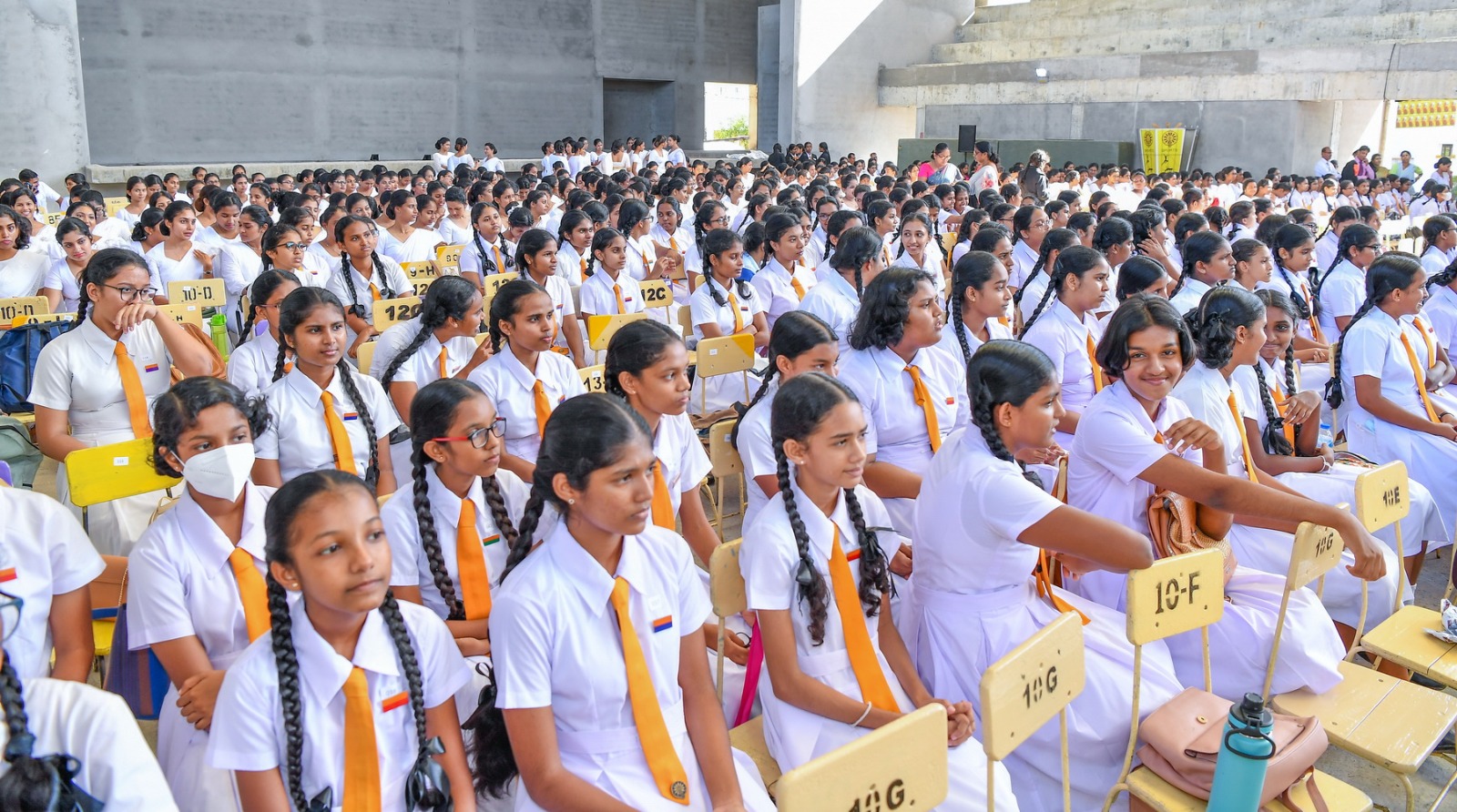
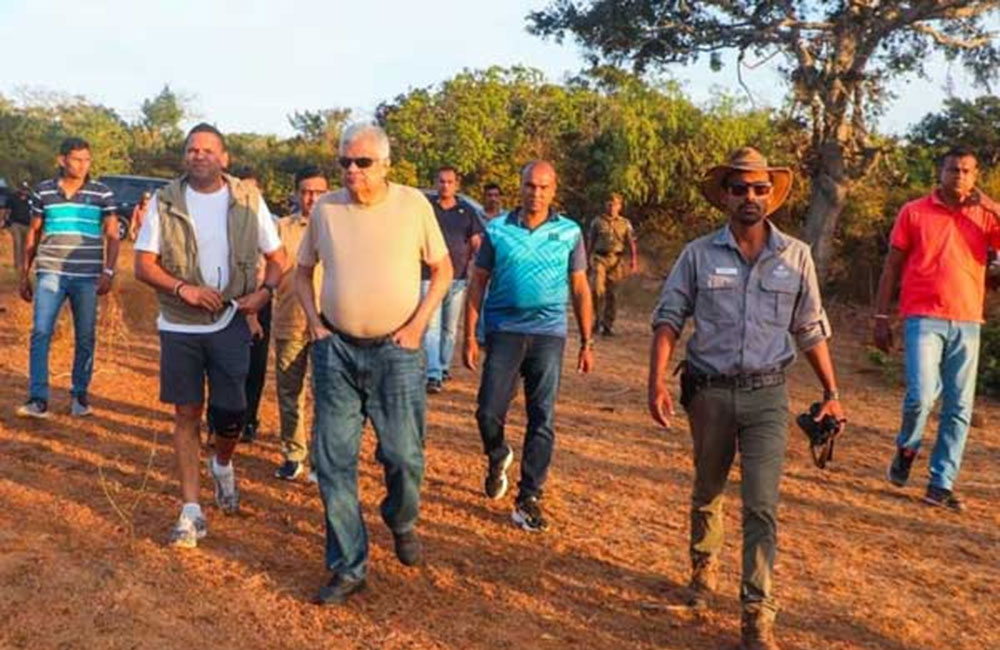
President visit Yala national park
President Ranil Wickremesinghe and US ambassador Julie Chung visited Yala national park yesterday (19).
During the visit, the president discussed introducing an online ticketing mechanism to facilitate the visitors.
He also took part in a water releasing to water bodies dried up due to the drought.
Tourism and Lands Minister Harin Fernando also participated in the visit.
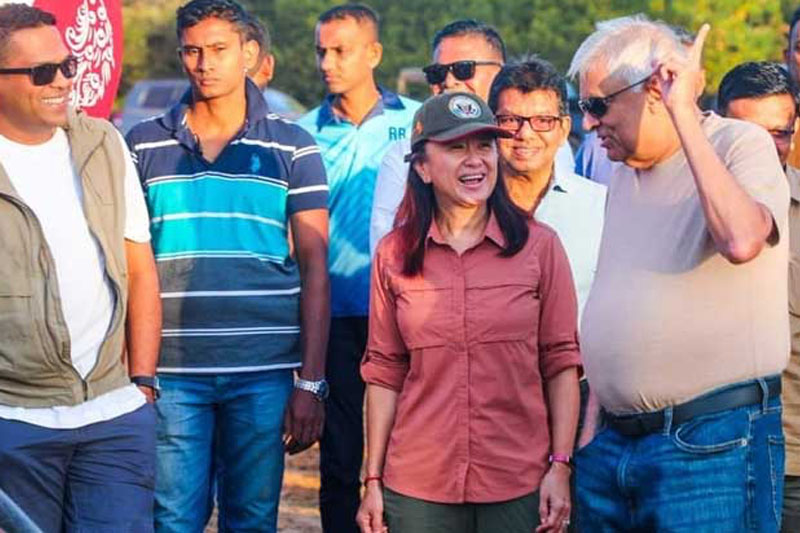
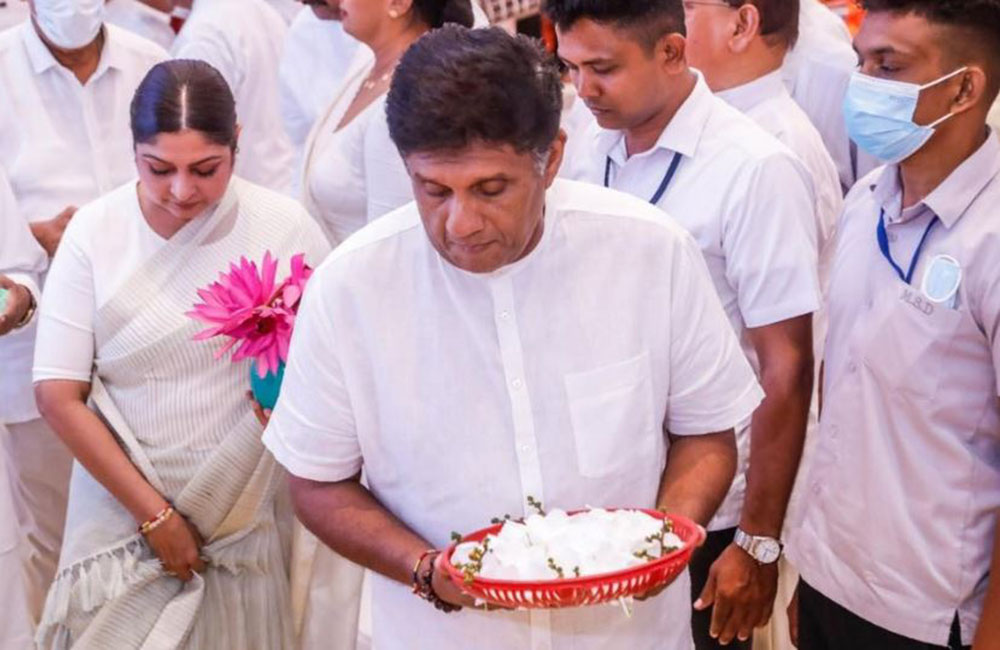
Sajith says yes to devolving powers within unitary Sri Lanka
Opposition leader Sajith Premadasa say he agrees to a devolution of powers within a unitary Sri Lanka.
In a speech to a meeting of Buddhist monks in Galle yesterday (15), Premadasa said his stand with regard to the 13th amendment to the constitution always remained unchanged.
He said his expectation was its implementation to devolve powers within a unitary country.
Hopes for a unitary, sovereign country whose territorial integrity and political freedom are guaranteed are threatened today, the opposition leader said.
Unity, harmony and integration of the nation are important for a unitary and sovereign country, he said.
Premadasa pledged to ensure equality of all citizens to live with dignity and to uphold the foremost place given to Buddhism by the constitution while protecting other religions and communities.
For all that, divisions in the country need to be eliminated first, he said, adding that he remained committed to the protection of all of its communities.
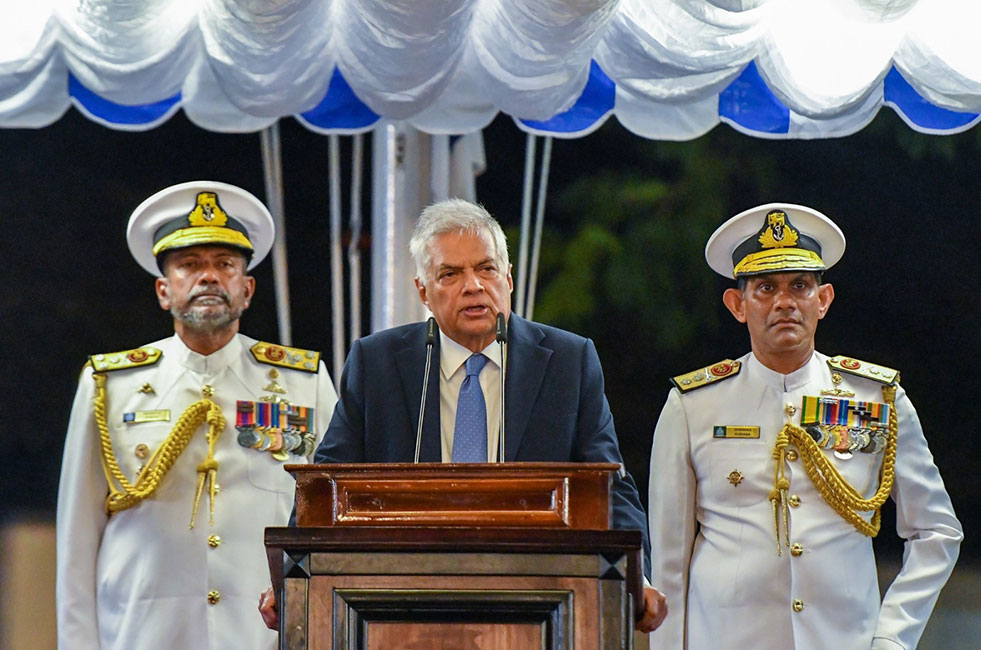
Comprehensive security review for SL : Team appointed
Special attention to securing the welfare and retirement of security forces personnel- Says President at the Presentation of Presidential Colours to the Sri Lanka Navy Volunteer Force.
President Ranil Wickremesinghe has emphasized the critical need for a comprehensive review of the country’s national security strategy. This review will encompass a broad range of factors, including emerging economic trends and the impacts of climate change.
To facilitate this review, a specialized team has been appointed. The team’s mandate is to thoroughly assess the nation’s security landscape and propose modern security policies for the National Security Council.
During his address at the Presidential Colours Awarding Ceremony at the Navy Volunteer Force Advance Naval Training Centre in Boossa yesterday (18), President Ranil Wickremesinghe articulated the forthcoming evaluation of the nation’s overarching national security strategy. He underscored that this comprehensive review would encompass a broad spectrum of factors, including emerging economic paradigms and the implications of climate change.
Highlighting the gravity of the matter, President Wickremesinghe revealed the appointment of a dedicated team, led by Major General Channa Gunathilaka (Rtd), to spearhead this endeavour. Once the team submits its findings, the President affirmed his commitment to subsequently formulate contemporary security policies under the purview of the National Security Council.
These statements were delivered during an event held yesterday (18) at the Boossa Advanced Naval Training Centre, where the Presidential Colours were conferred upon the Volunteer Force of the Sri Lanka Navy.
The Commander-in-Chief, President Ranil Wickremesinghe, arrived at the esteemed Boossa Advanced Naval Training Centre, where he was warmly received by the Commander of the Navy, Vice Admiral Priyantha Perera, and the Commander of the Volunteer Force.
In a subsequent ceremonial gesture, a distinguished military honour was accorded to the President, who actively participated in observing the parade. The President’s engagement culminated in the presentation of the prestigious Presidential Colours to the Volunteer Force of the Sri Lanka Navy, an event that was accompanied by the formal transfer of flags facilitated by the President.
Adding to the grandeur of the occasion, President Ranil Wickremesinghe also took part in appreciating the captivating drill display that ensued.
President Wickremesinghe, in his supplementary remarks, further elaborated on the historical context of the Navy’s origins. He acknowledged that prior to gaining independence, the Navy operated as a voluntary wing of the Royal Army. Notably, during the tumultuous period of the Second World War, the responsibility of safeguarding the pivotal Colombo port was entrusted to the Navy. In the post-independence era, a permanent naval force was duly established. The President underscored the significance of this occasion, wherein the new recruits join the ranks of a distinguished military lineage.
In his address, the President said;
Today marks your entry into the esteemed ranks of the Navy. When the Sri Lanka Navy was first established, maritime threats were virtually non-existent. The Indian Ocean was under the firm control of the British Navy during that era, and subsequent to their departure, our region remained relatively tranquil.
However, the landscape shifted dramatically in 1983 when we were confronted with the exigencies of conflict. On that pivotal day, the LTTE organization showcased its adeptness in naval operations, underscoring their familiarity with the sea. This was a novel experience for our forces, compelling us to undertake a profound study of maritime strategies. Over time, through the unwavering commitment and skilfulness of our security forces, we triumphed over this adversarial entity. This victory resonated on an international scale, highlighting the capabilities of our Navy in combat scenarios.
Reflecting on global counterparts grappling with similar challenges, such as the situation in Somalia, it becomes evident that an amalgam of significant naval forces was required. Remarkably, our nation stood resiliently on its own in addressing comparable challenges. As we commemorate 14 years since the culmination of that arduous conflict, the moment signals us to pivot our focus toward the present and the horizon that lies ahead.
Presently, the challenges we confront are distinct from the scenarios of 2009 and 1983. The dynamics of today’s landscape witness the encroachment of global power struggles into the Indian Ocean’s realm. On one front, a contest for supremacy unfolds between the United States and China across the expanses of the Pacific Ocean. Simultaneously, a power struggle emerges between Western nations and Russia in the context of Ukraine. This competition for influence extends even to remote reaches such as Niger in Africa, an adjacent nation to Mali, where our dedicated army is stationed.
Undoubtedly, the Indian Ocean hosts the world’s pivotal trade routes, making Sri Lanka an integral player at this stage. As we navigate these waters, it is imperative that we chart a course devoid of entanglement in these international rivalries, maintaining an impartial stance. Our foremost concern must be the safeguarding of our security within this sphere.
Internally, various countries grapple with threats that emanate from within, a predicament exemplified by incidents like the tragic events of the Easter Sunday attack.
Hence, it is incumbent upon us to fortify ourselves against such internal vulnerabilities as well. The reality we inhabit finds us enmeshed in global geopolitics; it is a reality we cannot disregard, compelling us to deliberate upon it, irrespective of our preferences.
Indeed, considering the evolving global landscape, I am inclined to initiate a comprehensive review of our nation’s prospective national security framework. Such evaluations are standard practice in numerous European countries, undertaken at intervals of five to ten years. These appraisals encompass an assessment of the nation’s vulnerabilities, available resources, and a strategic roadmap for implementation. These deliberations culminate in informed decisions, juxtaposing military capabilities with economic prowess. It is imperative for us to heed these principles.
Contemporary times have ushered in an array of advanced technological devices such as drones and others including those relevant to naval operations. Notably, the utilization of submarines in the Indian Ocean has become increasingly pronounced. In light of this, our maritime security strategy should pivot towards the development of a robust program tailored to submarine surveillance and control.
Furthermore, we must acknowledge the impermanence of our current aerospace assets. The trajectory of aviation and naval technologies suggests an enhanced reliance on innovative solutions in the future, surpassing the capacities of the present. Our trajectory forward necessitates a progressive incorporation of advanced technologies to effectively address the challenges that await us.
Indeed, the foundation for addressing future challenges lies in fortifying our nation’s economy and fostering swift development. A robust economic landscape would provide the necessary financial means to undertake essential endeavours. Recognizing the limitations posed by our status as a developing nation, it becomes evident that solutions for the future cannot be derived solely from past approaches.
In this context, my intent is to instigate a comprehensive review of our nation’s security apparatus. This review is poised to adopt a forward-looking perspective, intricately tied to emerging economic trends and the pressing issue of climate change. This recalibration of focus is paramount to effectively respond to the multifaceted challenges that lie ahead.
Upon the compilation of this review report, a blueprint for modernized security policies of the National Security Council will ensue. The task of orchestrating this critical endeavour has been entrusted to Defence 2030, which has diligently appointed an adept review team. This distinguished team, under the adept guidance of former Major General Channa Gunathilake, is dedicated to the preparation of this pivotal report. In support of these efforts, a dedicated office has been established, reaffirming our unwavering commitment to ensuring the comprehensive security of our nation.
Undeniably, the challenges that lie ahead extend far beyond the confines of weaponry or monetary considerations. Our paramount concern remains the welfare and prosperous future of our citizens, encompassing both those in active military service and those who will transition beyond it. Your dedication has not gone unnoticed, and we are committed to integrating your insights and perspectives into this new security review.
State Minister of Defence Pramitha Bandara Thennakone, Governor of the Southern Province Willy Gamage, Secretary to the Ministry of Defence General Kamal Gunaratne (retd), Chief of Defence Staff General Shavendra Silva, Commander of the Navy Vice Admiral Priyantha Perera, Chief of Naval Staff Rear Admiral Jayantha Kularatne, Volunteer Brigade Chief Rear Admiral Dhammika Kumara, and the distinguished senior officers of the Navy attended at this event.

Lanka Sathosa slashes prices of 09 essential food items
The prices of nine essential food items have been reduced with effect from Wednesday (17 Aug), Lanka Sathosa announced today.
Issuing a release in this regard, the state-owned retail network explained that the decision to revise the prices of nine essential food items was taken in a bid to ease the burden on consumers.
Accordingly, the prices of the following goods have been reduced:
• LSL milk powder (400g) – Rs. 970 (reduced by Rs. 29)
• Thai sprats - Rs.1160 per kilogram (reduced by Rs. 15)
• Brown sugar - Rs.350 per kilogram (reduced by Rs.10)
• Soya meat - Rs.625 per kilogram (reduced by Rs.25)
• Potatoes - Rs.325 per kilogram (reduced by Rs.05)
• Basmati rice - Rs.675 per kilogram (reduced by Rs.15)
• Garlic – Rs.630 per kilogram (reduced by Rs.05)
• Red raw rice (Rathu Kekulu) – Rs.147 per kilogram (reduced by Rs.02)
• Chickpeas - Rs.555 per kilogram (reduced by Rs.05)
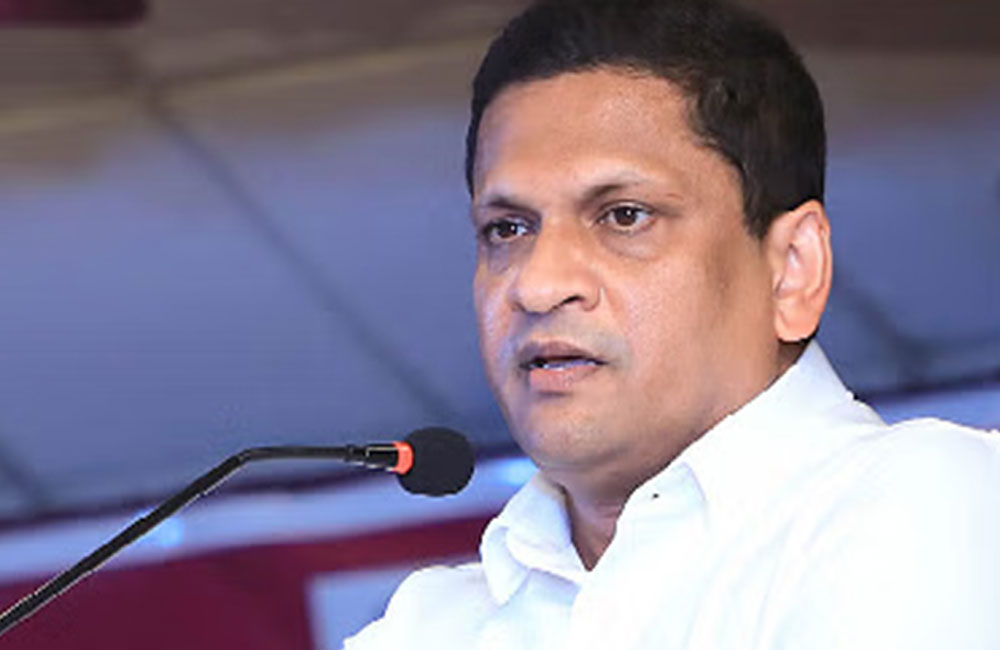
Lanza calls out SLPP 'double-standard' on power devolution
MP Nimal Lanza has accused the SLPP of having double-standards over the concept of devolution of powers.
In a statement, he said the SLPP had no ethical right to oppose the enforcement of the 13th amendment to the constitution.
Its leader Mahinda Rajapaksa has been agreeable even to a solution that goes beyond 13A, said Lanza.
However, SLPP general secretary Sagara Kariyawasam is now showing their double-standards by airing opposing ideas.
Communal harmony and reconciliation needs to be built to stabilize the economy and to build the country’s unitary status. Confidence-building among communities needs a sharing of powers acceptable to all. That will allow everybody’s contributions to economic development. It will help build the Sri Lankan notion. A power devolution acceptable to all communities will also build international confidence, he said.
Lanza asked Kariyawasam to explain himself for expressing an idea totally different to that of its leader and a majority of its MPs.
Another challenge
The MP also challenged the SLPP to announce, with consensus of all, its presidential candidate.
The SLPP is saying it is fielding a candidate and hinting at a leader with a three-letter name in order to mislead the public as it is without common consensus.
He also charged that a minority in the SLPP have today forgotten president Ranil Wickremesinghe who has created a democratic space for them to do politics once again by stabilizing the economy, society and politics.
Wickremesinghe, who was the SLPP’s only choice for national leadership, is now gaining public confidence.
He is the only and mature leader capable of rebuilding Sri Lanka with a vision for the future and with international support. Understanding that reality, a majority in the SLPP will ensure his victory at the next presidential election, while a minority without a public mandate and incapable of understanding public aspirations will be rejected by the country, he added.
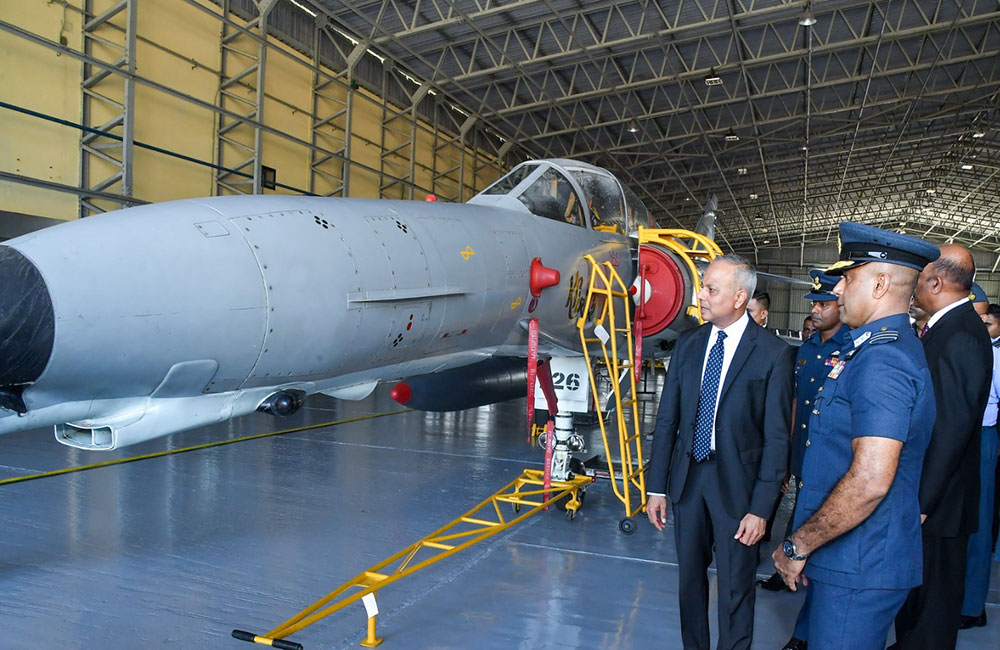
India’s assistance to SL went beyond the call of duty - NSA Ratnayaka
Noting the longstanding relationship between Sri Lanka and India, National Security Advisor Sagala Ratnayaka said that India had stepped up beyond the call of duty to lend Sri Lanka a hand during the recent economic crisis.
He also appreciated the assistance by American and Australian governments during difficult times in the area of maritime security.
NSA Ratnayaka made these remarks during a ceremony held to hand over a successor Donier-228 maritime surveillance aircraft to Sri Lanka by India that was held at the Sri Lanka Air Force Base in Katunayake today (16).
During the bilateral security discussions that transpired between India and Sri Lanka on January 9, 2018, in New Delhi, the potential acquisition of maritime surveillance aircraft akin to the Dornier type from India was brought to attention. The aim was to bolster Sri Lanka’s capabilities in maritime surveillance.
In response to Sri Lanka’s request, the Indian government took proactive measures during these deliberations. They decided to provide a Donier-228 maritime surveillance aircraft, which was part of the Indian Navy’s fleet, to Sri Lanka free of cost for a span of two years. The formal handover of this aircraft took place at the Sri Lanka Air Force Base Katunayake, with Mr. Baglay officiating.
Upon its delivery, the Donier-228 aircraft was instrumental in performing specialized tasks within Sri Lanka over the past year.
Subsequently, it underwent mandatory annual maintenance services in India. In lieu of the aircraft undergoing maintenance, a replacement Donier-228 maritime surveillance aircraft was assigned to the Sri Lanka Air Force at a ceremony held today in Katunayake.
Since its initial arrival in Sri Lanka, the Donier-228 maritime surveillance aircraft has significantly contributed to numerous operations.
These encompass a spectrum of activities such as monitoring and safeguarding Sri Lanka’s airspace and exclusive economic zone through maritime and coastal surveillance operations, executing search and rescue missions, and monitoring and controlling maritime pollution.
The official handover of the successor aircraft to Sri Lanka was attended by the High Commissioner of India to Sri Lanka Gopal Baglay and Secretary to the Ministry of Defence General Kamal Gunaratne (Rtd) and other officials.
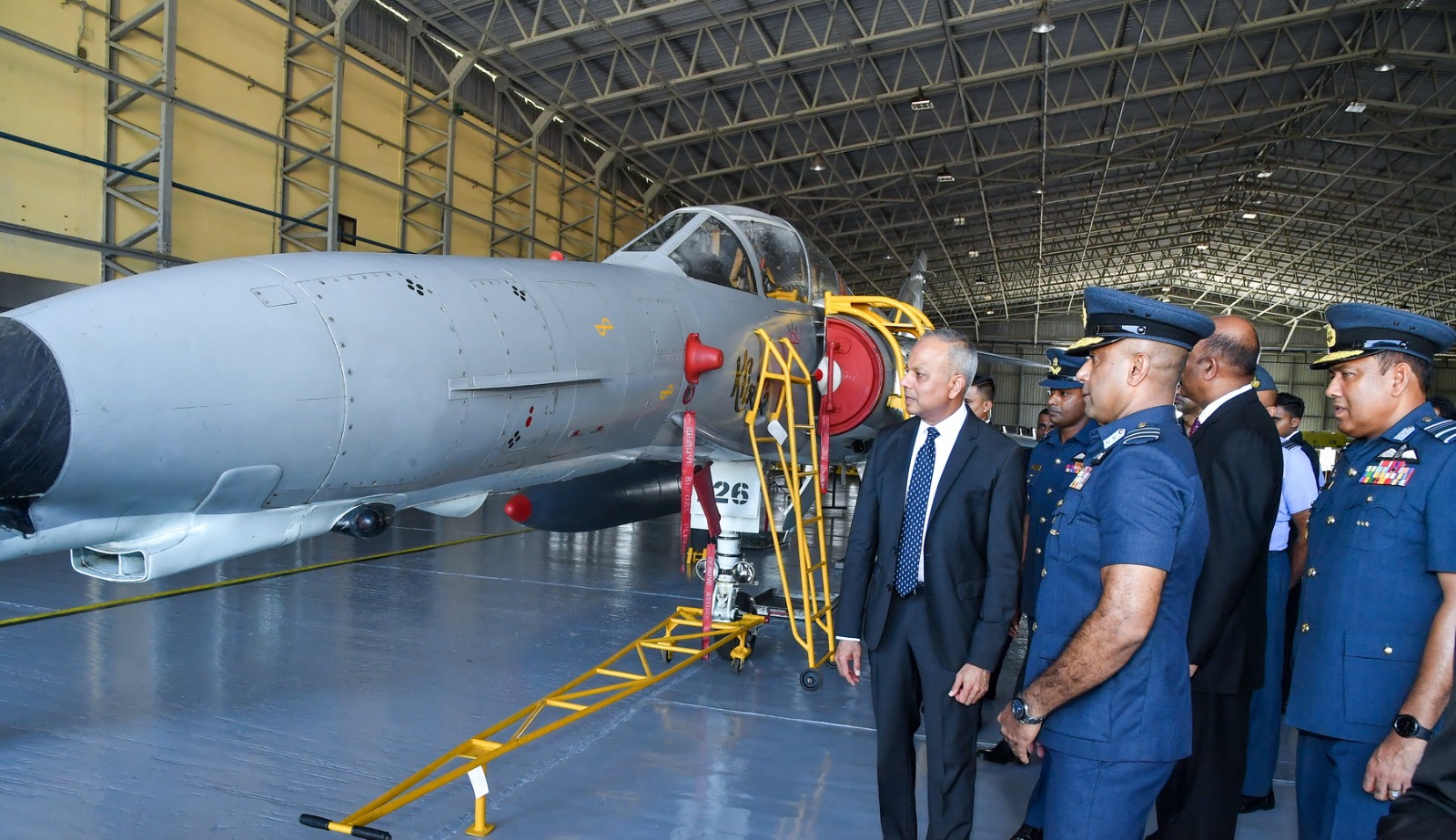
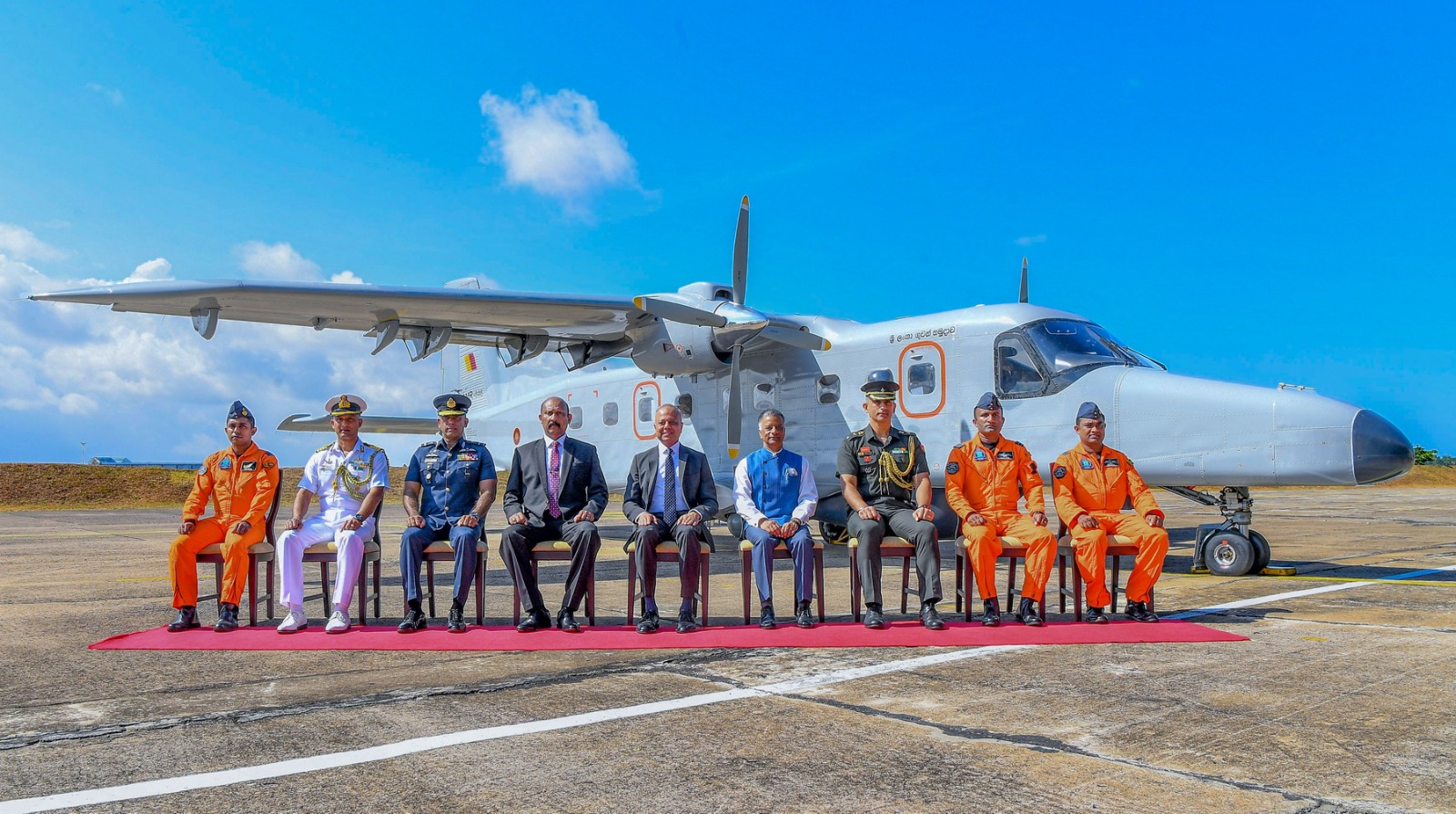
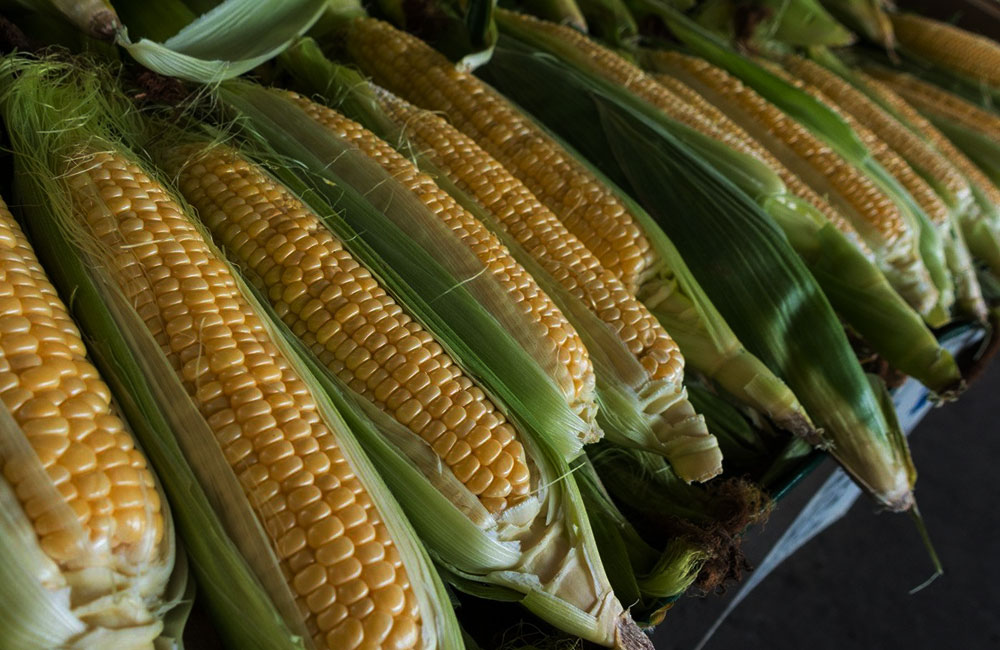
Import tax on maize reduced
The government has slashed the import tax on maize, State Minister of Finance Ranjith Siyambalapitiya says.
Accordingly, the import tax of Rs. 75.00 on 1 kilogram of maize has been reduced to Rs. 25.00 with effect from Thursday (Aug. 17).
Taking to Twitter, Siyambalapitiya explained that the move aims to bring down the price of animal feed produced using maize.
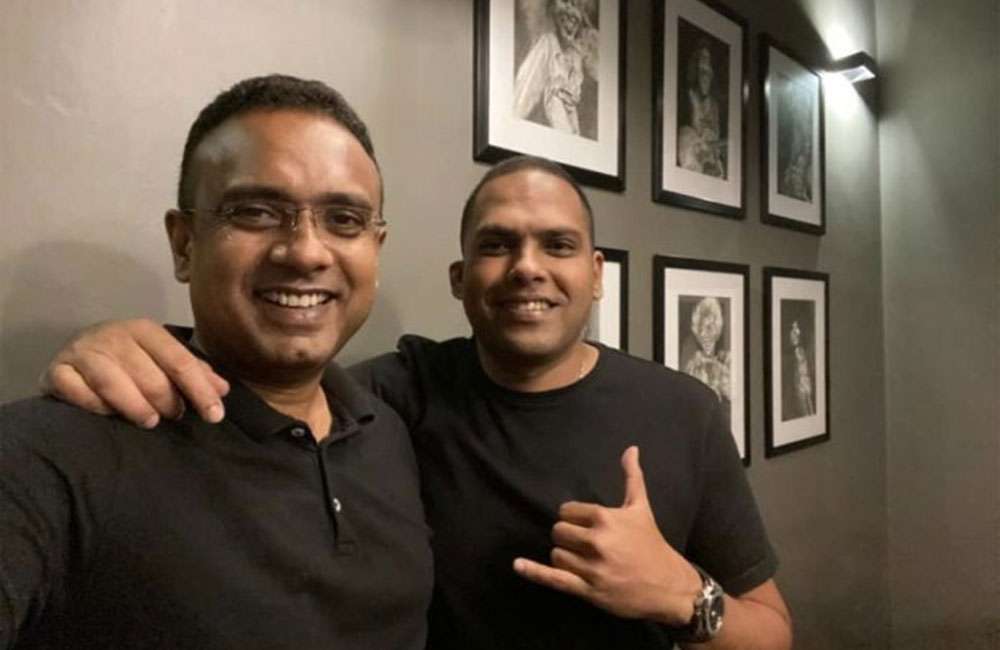
Harin & Manusha challenge SJB decision in SC
Parliamentarians of the Samagi Jana Balawegaya (SJB), Manusha Nanayakkara and Harin Fernando have filed a Fundamental Rights (FR) petition against the SJB’s decision pertaining to their party memberships.
The two Ministers have filed the FR petition before the Supreme Court seeking an order which nullifies the decision taken by the SJB to suspend their party membership and unseat them from the Parliament.
In July, the SJB’s Working Committee decided to expel Ministers Manusha Nanayakkara and Harin Fernando from the party after the duo joined President Ranil Wickremesinghe’s government.
Thereafter, in August, the Working Committee of the United National Party (UNP), President Wickremesinghe’s party, decided to lift the suspension that was previously imposed on Harin Fernando and Manusha Nanayakkara.
The UNP had previously suspended Fernando and Nanayakkara from the party after they had crossed over to the SJB.
Page 253 of 681